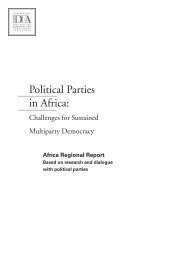Background Document - Danish Institute for Parties and Democracy
Background Document - Danish Institute for Parties and Democracy
Background Document - Danish Institute for Parties and Democracy
You also want an ePaper? Increase the reach of your titles
YUMPU automatically turns print PDFs into web optimized ePapers that Google loves.
observation missions in identifying the various elements of an election process that<br />
may impact on women’s equal participation. It sets out practical steps to be taken to<br />
integrate a gender perspective into election observation <strong>and</strong> should serve to ensure<br />
that conclusions drawn on the extent to which an election process meets OSCE commitments<br />
<strong>and</strong> other international st<strong>and</strong>ards <strong>for</strong> democratic elections fully takes into<br />
account how the election process affects both women <strong>and</strong> men.<br />
GENDER EQUALITY IN ELECTED OFFICE: A SIX-STEP ACTION PLAN<br />
OSCE/ODIHR, 2012, 76 pages<br />
The report is an overview of current trends in women’s political participation across<br />
the OSCE region. It identifies a Six-Step Action Plan, a series of fast-track strategic interventions<br />
which can contribute towards the attainment of gender equality in elected<br />
office, in a ‘nested’ model. Each of the six strategies can be a starting point <strong>for</strong> action,<br />
taking into consideration the variety of different political <strong>and</strong> electoral systems<br />
<strong>and</strong> traditions in place. It offers a visible underst<strong>and</strong>ing of the need to cover all of the<br />
areas, not just one or two, <strong>and</strong> it links up very well to the underst<strong>and</strong>ing of the need<br />
<strong>for</strong> both a top-down state focused response (legislation) <strong>and</strong> a bottom-up civil society<br />
oriented response (changing gender attitudes etc.).<br />
COUNTRIES IN TRANSITION – OPTIONS FOR WOMEN’S POLITICAL PARTICIPATION<br />
A conference report by Africa Contact, Gendernet, The <strong>Danish</strong> <strong>Institute</strong> <strong>for</strong> Human Rights,<br />
KVINFO, <strong>and</strong> <strong>Danish</strong> <strong>Institute</strong> <strong>for</strong> <strong>Parties</strong> <strong>and</strong> <strong>Democracy</strong>, 2011, 36 pages.<br />
The report is a short record of the conference which dealt with the challenges related<br />
to developing <strong>and</strong> enabling a democratic political culture <strong>for</strong> women in a large number<br />
of countries that are undergoing various processes of transition, including countries<br />
in Sub-Saharan <strong>and</strong> North Africa.<br />
The key areas of the conference were: the structures of exclusion – focusing on<br />
barriers to political participation; responses to exclusion – focusing on best practices<br />
<strong>for</strong> enhancing the political participation of women; <strong>and</strong> finally, workshop discussions<br />
on challenges <strong>and</strong> recommendations in relation to; local civil society cooperation; engaging<br />
international actors; from politics of presence to critical influence <strong>and</strong> action;<br />
<strong>and</strong> from elite driven democracy to broad-based participation.<br />
AFGHANISTAN’S PARLIAMENT IN THE MAKING – GENDERED UNDERSTANDINGS AND<br />
POLITICS IN A TRANSITIONAL COUNTRY<br />
UNIFEM & Henrich Böll Stiftung, 2009, 192 pages<br />
The report casts a light on the socio-political context <strong>and</strong> the space of agency <strong>for</strong> male<br />
<strong>and</strong> female parliamentarians in both houses of Parliament, the Wolesi Jirga <strong>and</strong> Meshrano<br />
Jirga. Due to conservative gender relations <strong>and</strong> traditional beliefs about the<br />
status of women in Afghan society, women politicians much more than their male<br />
counterparts have to prove themselves in their roles as the people’s representatives.<br />
However, instead of joining together as one <strong>for</strong>ce against the current political environment<br />
that is curtailing the political, social <strong>and</strong> economic freedoms that have only<br />
recently been achieved, women parliamentarians are being swept up in political, ethnic<br />
or regional power structures <strong>and</strong> agendas.<br />
WOMEN IN POLITICS DANISH INSTITUTE FOR PARTIES AND DEMOCRACY PAGE 60
















